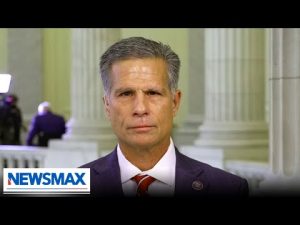The ongoing government shutdown has turned into a hefty financial headache, costing roughly $15 billion each week. Republican Congressman Dan Musser from Pennsylvania is crying foul, attributing this hefty price tag to the actions of the Democrats. As a political playlist of debates and negotiations unfolds, Musser is stepping up to express the need for responsible governance. Unfortunately, he admits that an assurance for a smoother resolution by January is elusive.
In a recent discussion, Musser painted a picture of the budgetary challenges ahead. His party is currently maneuvering through appropriations bills, striving to keep things orderly amid their chaotic backdrop. The first three bills have made progress, with bipartisan efforts paving the way for collaboration. However, some uncertainty lingers. Musser emphasized that it is essential for lawmakers to act like “the adults in the room,” which sounds like a tall order considering the current political atmosphere.
The representative further discussed the pressing issues plaguing the government’s spending habits. Musser pointed out the challenges of overspending, overtaxing, and the overregulation that has characterized the Biden administration. This situation raises eyebrows, and it seems to be creating a friction-filled climate where accountability is at stake. Will Democrats step up and engage in earnest discussions about these burdens? Musser seems hopeful but wary.
Among the hot topics for lawmakers is healthcare, particularly the future of the Affordable Care Act, commonly known as Obamacare. House Speaker Mike Johnson has indicated uncertainty regarding a House vote on extending the Covid-era benefits. Musser knows that the clock is ticking, with benefits set to expire at year’s end. The game plan involves rolling back some of the temporary subsidies that have, according to Musser, unnecessarily broadened the financial burden on taxpayers.
Additionally, Musser laid out ambitions to improve healthcare by redirecting funds from insurance companies directly to patients. This would be a significant overhaul, as it aims to enhance healthcare savings accounts. His vision also includes cutting pharmaceutical costs and expanding physician networks to boost competition and choice in the healthcare arena. It’s clear Musser wants to distance the system from the limitations of a single-payer approach, while still ensuring that vital services like Medicaid and Medicare continue to support those in need.
In sum, while Congressman Musser navigates the rocky terrain of healthcare reform and government spending, one can’t help but wonder what lies ahead. As negotiations continue and the end of January looms ever closer, it looks like it will be a bumpy ride for all involved. One thing is certain: the stakes are high, and finding a resolution that pleases everyone may feel a bit like herding cats.







